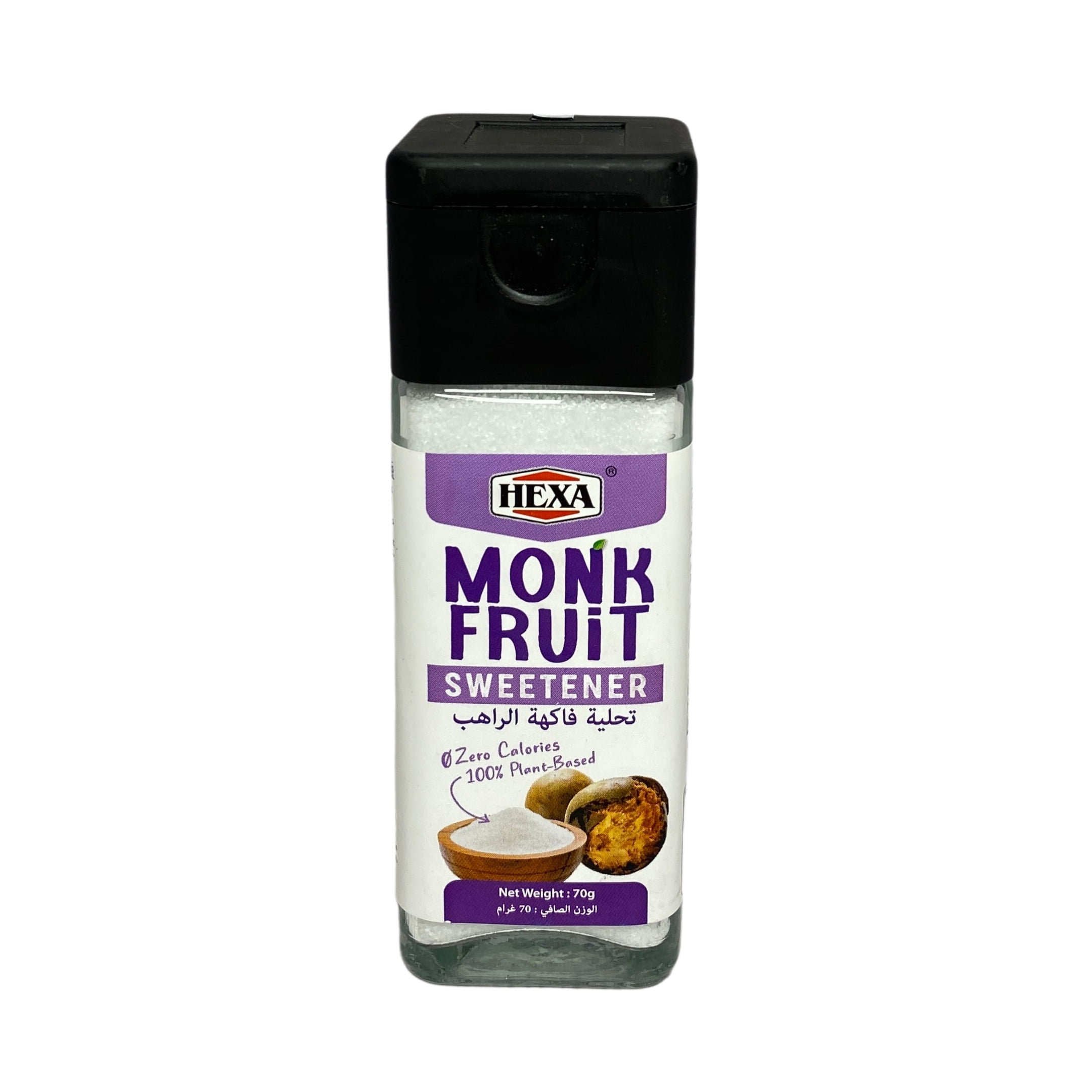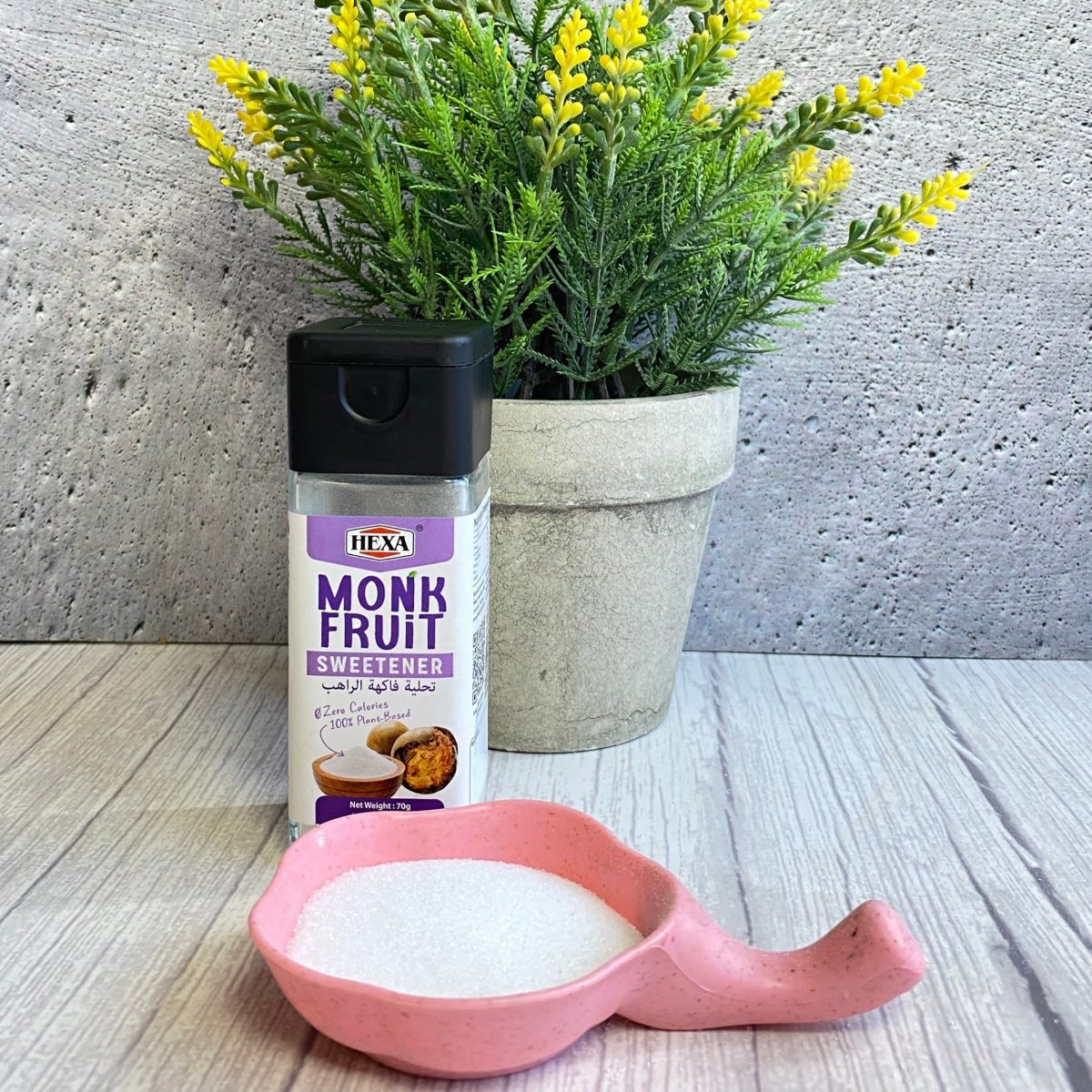
Monk fruit sweetener is a natural sweetener derived from the extract of the monk fruit (Siraitia grosvenorii), a small green gourd native to southern China and northern Thailand. Also known as “luo han guo”, monk fruit has been used in traditional Chinese medicine for centuries. The sweet taste comes from compounds called mogrosides, particularly mogroside V, which is several hundred times sweeter than sugar but contains no calories.
Monk fruit sweetener is gaining widespread popularity as a natural alternative to sugar and artificial sweeteners. With its zero-calorie content, and low glycemic index, monk fruit sweetener offers several benefits for individuals seeking to manage their sugar intake or adopt a healthier lifestyle. Below are some of the key advantages of incorporating monk fruit sweetener into your diet:
- Zero Calories
- Monk fruit sweetener is calorie-free, making it a suitable option for those looking to reduce their calorie intake or manage their weight.
- Low Glycemic Index
- Monk fruit sweetener has a low glycemic index, meaning it does not cause a spike in blood sugar levels. This makes it an excellent option for individuals with diabetes or those following a low-carb or ketogenic diet.
- Stable in Cooking and Baking
- Monk fruit sweetener is stable when exposed to heat, making it suitable for cooking and baking at high temperatures. It can be used as a sugar substitute in a wide range of recipes without compromising on taste or texture.
- Antioxidant Properties
- Monk fruit contains antioxidants called mogrosides, particularly mogroside V, which may have anti-inflammatory and antioxidant properties. While more research is needed to fully understand the potential health benefits of these compounds, they may offer additional health benefits beyond sweetness.
- Suitable for Various Dietary Needs
- Monk fruit sweetener is naturally gluten-free, vegan, and non-GMO, making it suitable for individuals with specific dietary restrictions or preferences.
Ingredients
Erythritol and monk fruit extract
Serving Suggestion
Monk fruit sweetener has gained popularity as a sugar substitute, particularly among people looking to reduce their sugar intake or control their blood sugar levels. It’s commonly available in powder form and can be used in a variety of ways. Monk fruit sweetener can be used in various applications as a sugar substitute. Here are some recommendations to use monk fruit sweetener:
- Beverages
- Monk fruit sweetener can be added to hot or cold beverages such as coffee, tea, lemonade, smoothies, and cocktails. It dissolves easily and provides sweetness without adding calories or spiking blood sugar levels.
- Baking
- Monk fruit sweetener can be used in baking to replace sugar in recipes for cakes, cookies, muffins, and other baked goods. It’s important to note that monk fruit sweetener is much sweeter than sugar, so you’ll need to use less of it in recipes.
- Cooking
- Monk fruit sweetener can also be used in cooking to sweeten sauces, marinades, dressings, and other savory dishes. It’s particularly useful in recipes where you want to add sweetness without adding extra calories or affecting the texture of the dish.
- Frozen Desserts
- Monk fruit sweetener can be used to sweeten homemade ice cream, sorbet, popsicles, and other frozen desserts. Because it doesn’t crystallize like sugar, it can help prevent ice crystals from forming in frozen treats.
- Yogurt and Oatmeal
- Monk fruit sweetener can be stirred into yogurt or oatmeal to add sweetness without adding extra calories. It’s a convenient way to sweeten these foods without relying on sugar or artificial sweeteners.
- Salad Dressings
- Monk fruit sweetener can be used to sweeten homemade salad dressings, such as vinaigrettes or creamy dressings. It provides sweetness without overpowering the other flavors in the dressing.
- Fruit Preserves
- Monk fruit sweetener can be used to sweeten homemade fruit preserves, jams, and jellies. It helps to enhance the natural sweetness of the fruit without the need for added sugar.
When using monk fruit sweetener in recipes, it’s important to note that it can have a slightly different flavor profile compared to sugar, so you may need to adjust the amount used to suit your taste preferences. While monk fruit sweetener is generally considered safe for most people, some individuals may experience gastrointestinal discomfort or allergic reactions. As with any sweetener or dietary supplement, it’s essential to use monk fruit sweetener in moderation and consult with a healthcare professional if you have any concerns, particularly if you have a pre-existing medical condition or are pregnant or breastfeeding.
Storage
Store in a cool, dry place. Keep contents in an airtight container after opening.
Get it now via:-

